Caroline Leavitt's Blog, page 62
April 14, 2015
The astonishing Stewart O'Nan talks about West of Sunset, Fitzgerald's last years, the Golden Age of Hollywood, and so much more
Stewart O'Nan is a genius. He's the author of some of my favorite books on the planet, including Emily Alone, The Odds, and now his latest, West of Sunset, an extraordinary novel that focuses on the last few months of Fitzgerald's life, as he struggles to find his footing with Hollywood, Zelda, Scottie, and Sheila Graham. Everyone from The New Yorker to the Boston Globe revered the book--and so did I. I'm always happy when I get to talk to Stewart, so this is really a pleasure post for me, and his answers formed an essay, which also made me happy. A million thanks, Stewart!
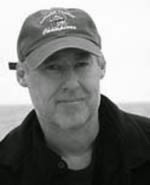
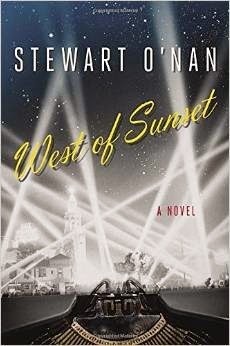
I wanted to write a lush, romantic book but at the same time have that fear of pennilessness always with Scott. That's the split I see there: it's the Golden Age of Hollywood, and everyone around him is famous and rich--Dorothy and Alan are fresh from co-writing A Star is Born, Bogie's on the cusp of stardom, S.J. Perelman's writing the classic Marx Brothers films, Ernest is the most famous writer in the world, and here's Scott, and they all know from his Crack-Up essays in Esquire that he's dead broke and trying but continually falling off the wagon.
In several ways he's a fish out of water in Hollywood, which is what he was his whole life. At least at The Garden of Allah, he's surrounded by friends who've known him since 1920 back in New York, and who know how talented he is, and what a sweetheart he is when he's sober, and how hard it's been for him since losing Zelda. Before this, in North Carolina, he was living alone in hotels and drinking his days away, borrowing money from Max & Ober. Now he's got a shot at fulfilling his responsibilities and getting out of debt. All he has to do is hang on to a job, and while he has his ups and downs out there, ultimately he manages to pay off everyone he owes and even has enough to buy the time to start on The Last Tycoon.
What surprised me the most in my research was that he worked on Gone With the Wind. I had no idea. Or that he wrote a screen version of Babylon Revisited and had a meeting with Shirley Temple and her mother about it. Or that at the same time Dorothy Parker, Aldous Huxley and James M. Cain all worked on the same floor there in the Thalberg Building at MGM. Also that Scott was on the lot while they were shooting The Wizard of Oz. Or that Joan Crawford specifically asked for him to be her screenwriter on several projects. Or that he went to the Oscars one year. That he had to hock his car to pay rent. And all the nightclubs and restaurants, the months Sheilah arranged for him to live on the beach in Malibu in what was then called the Movie Colony, their initial dinner with Scottie, their trips to Catalina. And of course all the amazing settings there in L.A., from the old back lot to the Palisades to the drought-stricken valley. The scenery's big and elemental.
When we think of Fitzgerald, we think of the writer or the alcoholic, the romantic, but he was also a husband and father. He was terrible with money, and from 1924--before Gatsby!--till his last years in Hollywood, he was constantly in debt. Yet he never neglected his responsibilities to his family. When Zelda is first hospitalized in 1929, he becomes in essence a single parent to Scottie, and does his best to provide for her. And though, by the time the novel begins, Zelda's been in Highland Hospital for several years, she's still the most important person in his life. As I say in the book, he would never deny that they were meant for each other, even as he recognizes that she's deeply ill. He's still devoted to her, though in most respects their marriage is over. Impossible as he knows it is, he wants to somehow repair the damage that's broken the bond between her and Scottie, and arranges for them to take family vacations during Zelda's furloughs from the asylum. He keeps trying to do what's right in an impossible situation, and eventually it breaks him down.
Bogart and Mayo Methot serve as a bit of a chorus. They were famous for their drinking and fighting at the Garden of Allah, and I thought they'd be a good foil--along with the other odd couple of Dottie and Alan--for the brand-new couple of Scott and Sheilah. Their wisecracking helps undercut the melancholy, and reminds the reader of the blending of the real and movie worlds that's taking place there. Bogie's voice came naturally to me, since I've seen everything he's been in--and I think it's familiar to many readers as well. For how the two banter, I borrowed the style of The Thin Man films.
No secret to how I write: slowly. 9 to 5, and I try to get a single double-spaced page a day. Try to hold onto whatever moods the POV characters are in and follow whatever direction the action is going. Stay close, just try to understand what's on the characters' minds, what's important to them. Sit there and try to figure out what's next. Patience is all. And knowing you're going to fix it later anyway.
Right now I've just finished a new novel about Jerusalem in 1946. It's about identity and political violence and fear and trust. So now I'm obsessed with starting something else. Stephen King says a book takes you away, and that's what I'm looking for, a new project that will take me somewhere unexpected, somewhere I've never been.
Thanks again for all your kind words, and for taking the time to have me on the blog. Now I'm off to Pitt-Greensburg to sing for my supper.
Stewart
Published on April 14, 2015 09:51
Kamy Wicoff talks about WISHFUL THINKING, magic mushrooms, motherhood, writing, and so much more
<!-- /* Font Definitions */ @font-face {font-family:Wingdings; panose-1:5 0 0 0 0 0 0 0 0 0; mso-font-charset:2; mso-generic-font-family:auto; mso-font-pitch:variable; mso-font-signature:0 268435456 0 0 -2147483648 0;} @font-face {font-family:"MS 明朝"; mso-font-charset:78; mso-generic-font-family:auto; mso-font-pitch:variable; mso-font-signature:-536870145 1791491579 18 0 131231 0;} @font-face {font-family:"Cambria Math"; panose-1:2 4 5 3 5 4 6 3 2 4; mso-font-charset:0; mso-generic-font-family:auto; mso-font-pitch:variable; mso-font-signature:-536870145 1107305727 0 0 415 0;} @font-face {font-family:Cambria; panose-1:2 4 5 3 5 4 6 3 2 4; mso-font-alt:Cambria; mso-font-charset:0; mso-generic-font-family:auto; mso-font-pitch:variable; mso-font-signature:-536870145 1073743103 0 0 415 0;} /* Style Definitions */ p.MsoNormal, li.MsoNormal, div.MsoNormal {mso-style-unhide:no; mso-style-qformat:yes; mso-style-parent:""; margin:0in; margin-bottom:.0001pt; mso-pagination:widow-orphan; font-size:12.0pt; font-family:Cambria; mso-ascii-font-family:Cambria; mso-ascii-theme-font:minor-latin; mso-fareast-font-family:"MS 明朝"; mso-fareast-theme-font:minor-fareast; mso-hansi-font-family:Cambria; mso-hansi-theme-font:minor-latin; mso-bidi-font-family:"Times New Roman"; mso-bidi-theme-font:minor-bidi;} a:link, span.MsoHyperlink {mso-style-priority:99; color:blue; mso-themecolor:hyperlink; text-decoration:underline; text-underline:single;} a:visited, span.MsoHyperlinkFollowed {mso-style-noshow:yes; mso-style-priority:99; color:purple; mso-themecolor:followedhyperlink; text-decoration:underline; text-underline:single;} .MsoChpDefault {mso-style-type:export-only; mso-default-props:yes; font-family:Cambria; mso-ascii-font-family:Cambria; mso-ascii-theme-font:minor-latin; mso-fareast-font-family:"MS 明朝"; mso-fareast-theme-font:minor-fareast; mso-hansi-font-family:Cambria; mso-hansi-theme-font:minor-latin; mso-bidi-font-family:"Times New Roman"; mso-bidi-theme-font:minor-bidi;} @page WordSection1 {size:8.5in 11.0in; margin:1.0in 1.25in 1.0in 1.25in; mso-header-margin:.5in; mso-footer-margin:.5in; mso-paper-source:0;} div.WordSection1 {page:WordSection1;} </style> --> <div class="MsoNormal"><br /></div><div class="MsoNormal"><i><a href="http://kamywicoff.com/"><span style="mso-bidi-font-style: normal;"> </span>Kamy Wicoff </a>is the bestselling author of the nonfiction book I Do but I Don’t: Why the Way We Marry Matters. But let's celebrate her debut novel now, Wishful Thinking, an exhilarating satire about modern motherhood, with a soupcon of fantasy throw in.</i></div><i></i><i>She is the cofounder of one of the world’s largest communities for women writers, <a href="http://www.shewrites.com/" target="_blank">www.shewrites.com</a>. She is also cofounder, with Brooke Warner, of <a href="http://www.shewritespress.com/" target="_blank">She Writes Press</a>. She Writes and She Writes Press are part of the <a href="http://www.gosparkpoint.com/" target="_blank">SparkPoint Studio</a> family. Thank you for being here, Kamy!</i><br /><div class="MsoNormal"><br /></div><div class="MsoNormal"><br /></div><div class="MsoNormal"><br /></div><div class="separator" style="clear: both; text-align: center;"><i style="mso-bidi-font-style: normal;"><a href="http://3.bp.blogspot.com/-hZZzRsNP_lw..." imageanchor="1" style="margin-left: 1em; margin-right: 1em;"><img border="0" src="http://3.bp.blogspot.com/-hZZzRsNP_lw..." height="320" width="213" /></a></i></div><br /><div class="separator" style="clear: both; text-align: center;"><i style="mso-bidi-font-style: normal;"><a href="http://2.bp.blogspot.com/-sK0Gwv0lLqI..." imageanchor="1" style="margin-left: 1em; margin-right: 1em;"><img border="0" src="http://2.bp.blogspot.com/-sK0Gwv0lLqI..." height="320" width="207" /></a></i></div><br /><div class="MsoNormal"><br /></div><div class="MsoNormal"><i style="mso-bidi-font-style: normal;">You've touched THE nerve of working mothers--how can we possibly be there for our kids AND for our bosses. Why is this so difficult and do you think it gets easier? Kamy wickoff</i> </div><div class="MsoNormal"><br /></div><div class="MsoNormal">It is THE question isn’t it? I wrote the book because it’s something I struggle with myself, and I often like I just don’t have enough time to do everything I need to do. But is lack of time really the problem? My main character, Jennifer, is suddenly given all the time she needs; she can be at afterschool pickup and at an important work meeting; she can go on the school field trip and show up for her job. The question was, would her life then be great? What Jennifer (and I) discovered is that unless you address the underlying “it’s never enough no matter what you do” mentality our culture constantly enforces on us both as workers and as parents, no amount of time will provide the balance you seek. Part of why it is so difficult is that workplaces are <a href="http://gender.stanford.edu/news/2013/... designed for men with stay-at-home wives</a>, a la Don Draper, and the standards mothers are held to, are, incredibly, <a href="http://www.slate.com/blogs/xx_factor/... now than they were then</a>! But I do believe it can, and will, get easier if we do two critical things: 1) stop blaming ourselves for our personal failings in a system that isn’t set up for us to succeed, and instead fight for workplace reform (everyone should join <a href="http://www.momsrising.org/">M... and 2) take a long view when balancing being their for your kids and for your work. Sometimes one has to take precedence over the other, but over time, if you are mindful, it will all even out. I find that’s true for me, anyway.</div><div class="MsoNormal"><br /></div><div class="MsoNormal"><i style="mso-bidi-font-style: normal;">I love the whole Time Travel appeal of the novel, of using time to solve our problems the way your heroine Jennifer THINKS that she can. Can you talk about what sparked this ingenious idea for you?</i></div><div class="MsoNormal"><br /></div><div class="MsoNormal">I was reading the Harry Potter books with my son several years ago and I thought, I wish there was a book like this for moms. And then I thought, if I could give myself, or any working mom I know, one power, what would it be? The answer came immediately: the ability to be in two places at once. (As my sons would say, <i style="mso-bidi-font-style: normal;">duh</i>.) I knew from the beginning, however, that I didn’t want to bestow this power on my main character through magic. I have always been an amateur lover of physics, following the construction of the Large Hadron Collider and the search for the Higgs boson particle, etc., and I have also always felt that women in science suffer some of the worst sexism around. (This <a href="http://www.sciencefriday.com/segment/... Science Friday podcast</a> underscored that for me.) I loved the idea of writing a strong female scientist into the book, and after consulting with some real physicists, I determined that the time travel app, via wormhole, was the most realistic way to go based on what physicists believe is possible. The notion of <a href="http://news.discovery.com/space/steph... of wormholes in quantum foam</a>, for example, is an idea from Stephen Hawking himself.</div><div class="MsoNormal"><br /></div><div class="MsoNormal"><i style="mso-bidi-font-style: normal;">What kind of writer are you? Do you have rituals, do you have a Post-it addiction, the way I do, do you map your stories out, or do you like to be surprised?</i></div><div class="MsoNormal"><br /></div><div class="MsoNormal">I have to say that for this project, I became a devoted user of <a href="https://www.literatureandlatte.com/sc..., which I had never used before. (It even includes a form of Post-it notes, Caroline, where you can create virtual index cards!) I love to be thorough in my research when I am creating a world: I knew, for example, the exact building in the West Village Jennifer lived in, down to its GPS coordinates and address. In Scrivener, I could collect links and facts in an organized way and draw on them throughout the writing of the book, which was a life saver, because when you are attempting to write something that involves time-travel, things get complicated fast. As for mapping the story out—I started by just writing, about fifty or sixty pages, to get a sense of the voice, the characters, and whether I had a viable idea, and then I pulled back to outline. (I <a href="http://www.shewrites.com/profiles/blo... about this for She Writes</a> and got lots of feedback and tips from other writers, too.) I felt free to go off the outline when needed, but it was tremendously helpful in giving me a sense of direction and a sense of accomplishment each time a plot-milestone was reached.</div><div class="MsoNormal"><br /></div><div class="MsoNormal"><i style="mso-bidi-font-style: normal;">There is so much witty and sharp social commentary in Wishful Thinking that I found myself laughing even as I underlined passages. Can you talk a bit about that?</i></div><div class="MsoNormal"><br /></div><div class="MsoNormal">Firstly, thank you! Christina Baker Kline, when she first read the manuscript, also commented on how much she loved the social critique contained in the book, and urged me to emphasize that as we marketed it, rather than simply selling it as a “fun read.” (Though you were definitely meant to laugh. I cracked myself up a few times while writing it.) I think it was an enormous asset to write this book as a forty-something woman with some life experience under her belt, and years of observations about this particular part of life ripe and ready to go. Jennifer’s is a world I know well, and it’s an amalgam of the work and life experiences of many, many women I know, and of the confidences and conundrums we’ve shared.</div><div class="MsoNormal"><br /></div><div class="MsoNormal"><i style="mso-bidi-font-style: normal;">You also are the co-founder of the wonderful SheWrites Press. Tell us about that, please, and has running a press influenced your writing in any way?</i></div><div class="MsoNormal"><br /></div><div class="MsoNormal">One huge thing it did for me – and that it can actually do for any writer who is producing a book worthy of being published, whether or not she has a big “platform” <a href="http://www.publishersweekly.com/pw/by... of the way our model works</a> – was to free me from fretting during the writing process that the book might not ever see the light of day. When it was finished, I did have my agent take it out to traditional publishers to test the marketplace (my first book, <a href="http://www.amazon.com/Do-but-Don%C2t-... Do But I Don’t</a>, was traditionally published), and I got an offer, but in the end it wasn’t good enough to justify the terrible royalties traditional presses give. (If you want to read more about that decision, you can check out the post I wrote <a href="http://www.shewrites.com/profiles/blo....) At this point, of course, I am incredibly nervous about having chosen to publish as a true entrepreneur rather than taking an advance up front, but I believe in this model as the future “third way” of publishing and am happy to be one of its pioneers, <a href="http://shewritespress.com/our-authors... with my other amazing SWP sisters</a>.</div><div class="MsoNormal"><br /></div><div class="MsoNormal"><i style="mso-bidi-font-style: normal;">What's obsessing you now and why?</i></div><div class="MsoNormal"><br /></div><div class="MsoNormal">I am obsessing about my book and about whether anyone will buy it, why do you think!? (Ha.) I am also obsessing about <a href="http://www.nytimes.com/2013/01/06/mag... Saunders</a>, <a href="http://www.newyorker.com/magazine/201... article</a>I read in the New Yorker about magic mushrooms helping cancer patients face their fear of death, and this <a href="http://www.alexandraposen.com/quietud... four minute video</a> by the artist Alexandra Posen, who is also a mom friend. How did she <i style="mso-bidi-font-style: normal;">do</i> that?</div><div class="MsoNormal"><br /></div><div class="MsoNormal"><i style="mso-bidi-font-style: normal;">What question didn't I ask that I should have?</i></div><div class="MsoNormal"><br /></div><div class="MsoNormal">This was perfect. <span style="font-family: Wingdings; mso-ascii-font-family: Cambria; mso-ascii-theme-font: minor-latin; mso-char-type: symbol; mso-hansi-font-family: Cambria; mso-hansi-theme-font: minor-latin; mso-symbol-font-family: Wingdings;"><span style="mso-char-type: symbol; mso-symbol-font-family: Wingdings;">J</span></span></div><div class="MsoNormal"><br /></div><div class="MsoNormal"><br /></div>
Published on April 14, 2015 09:40
April 9, 2015
Alice Eve Cohen talks about The Year My Mother Came Back, worrying, writing, and more!
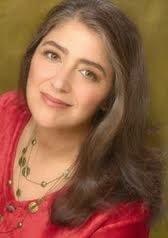
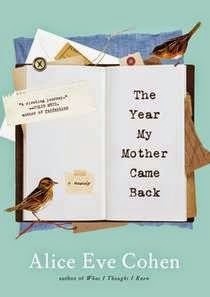
I'm thrilled to be interviewing Alice Eve Cohen here. Her memoir, The Year my Mother Came Back, is about how relationships--especially those with our mothers--don't end after death, but continue in surprising and profound ways. Her first memoir, What I Thought I Knew won the Elle's Grand Prix for Nonfiction; it was selected as one of Oprah Magazine’s 25 Best Books of Summer and Salon's Best Books of the Year. Her solo theater adaptation of the book has been produced at the Kitchen Theater in Ithaca and other venues. Thank you so much, Alice!
Q: There’s so much in the book about when we ourselves become mothers, we yearn for our own mothers--even if they were not stellar in the maternal department. Even though your mom is dead, you still find yourself needing her, and most miraculously, you get to have her.
A: I’d pretty much exiled my mother from my memories for decades. During this crazily difficult year, I found myself yearning for her in a way I never had before. Then suddenly, there she was, sitting beside me at my kitchen table, typing on her old, manual typewriter.A fringe benefit of writing this book is that my daughters also get to have her. Just last night, I asked Eliana, my fifteen-year-old, what she thinks of her grandmother, now that she’s read the book, and she said, “She inspires me. I’m humbled by her work and dedication as an early feminist, before that was accepted at all in American society. I wish I could meet her. I feel privileged even to be able to meet her in this way, through this book.”
Q: What I so love about this memoir is that you have included the fantasies you had.
A: The fantasies are the heart of the book. My mother died such a long time ago that I’d nearly forgotten her. She came back to me in a flood of memories and vivid fantasies. She was at my side during my radiation treatments. We had conversations and arguments. She revealed secrets she’d never told me before. I asked her advice on parenting. Her answers surprised and enraged me. We fought. We forgave each other.For a while I thought the memoir police would arrest me, for violating some unwritten law of memoir-writing. I talked to my editor about it, and I’m so grateful that she encouraged me to free my imagination. It allowed me to bring my mother to life on the page as a fully realized character.
Q: Did writing this book intensify the conversations you have with your mother (do you still have them?) or lessen them?
A: My mother is with me, but in a very different way now. She’s not in the room any more.
A: You recognize that time alters memory. Yet, there is still such truth on every page. Which makes me want to ask you: If stories change with the telling, and we are always changing ourselves, what do we mean by truth?
B: Wow, your question goes to the fundamental, paradoxical core of memoir. A memoir is a story told through a subjective process that includes remembering and forgetting, imagining and inventing. Everything alters memory—time, emotion, current events, brain chemistry, caffeine, aging, childbirth, politics, you name it. Whenever we look at an old photograph, or hear an evocative piece of music, or read someone else’s account of that event, it changes our memory. From the moment an experience slips from the present into the past, it starts to change. Every time we describe an experience, the story evolves, and so does our memory of it. I have an insatiable appetite for stories. I love the fluid and mutable quality of storytelling. Humans are the storytelling species. It’s in our DNA. I love being a storyteller.
Q: Do you think if you had written this book say, ten years from now, it would be different?
A: I can’t imagine writing this book at any other time. I wrote it exactly when I needed to.
Q: What I also love about the book is the humor. And then you move to emotion that’s wrenching.
A: I’m not religious, but I have a religious faith in humor. I subscribe to the belief that even in the most difficult circumstances, there’s salvation in story value. I love to make people laugh, and if I can’t laugh at myself I’m doomed. In Jewish folklore, if you’re too happy, it’s an invitation to the Evil Eye. Once you let the Evil eye in, you’re in terrible danger. In the book, I talk about the Evil Eye in a self-mocking way. When things are going too well, I’m terrified.
Q: I love your question, “Who gets happiness?” Care to answer?
A: I’m better at questions than answers. There’s a chapter about happiness in the book, and it’s all questions.
Q: This was one hell of a year for you, yet you managed with grace and humor. Are you a worrier?
A: I am a word-class worrier, an Olympic gold medalist.
Q: What’s obsessing you now and why?
A: I’m obsessed with my students’ stories. I teach creative writing and playwriting at The New School. My current playwriting students are wonderfully diverse—nationality, race and ethnicity, sexual orientation, and age. Their plays are equally diverse, and I’m fascinated by their works-in-progress. Q: (What question didn’t I ask that I should have?) What are you working on now?
A: I’m writing a novel, and I’m thrilled to be making stuff up.
Published on April 09, 2015 14:19
Lisa Scottoline talks about Every Fifteen Minutes, sociopaths, criminality, writing, and so much more.
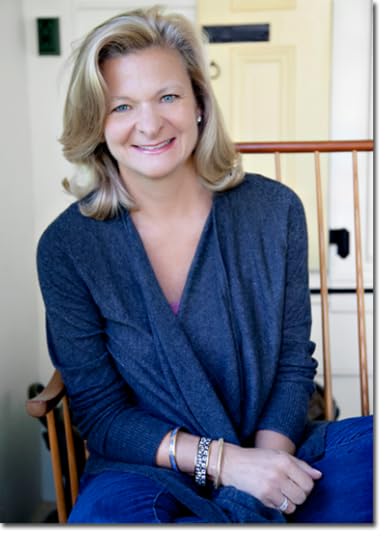
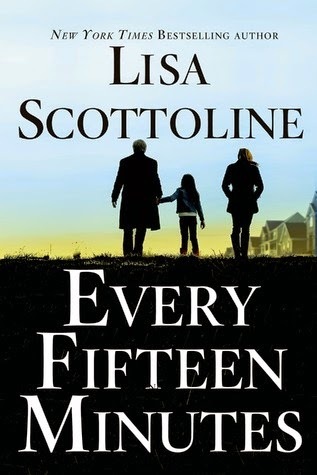
I could talk about how kind and funny and warm Lisa Scottoline is. Or how famous. Lisa's books have solidly landed on all the major bestseller lists including The New York Times, USA Today, The Wall Street Journal, Publisher's Weekly, Washington Post, and The Los Angeles Times. One of her novels, Look Again, was named a"One of the Best Novels of the Year" by The Washington Post, and one of the best books in the world as part of World Book Night 2013.
Or I could take about her newest novel, Every Fifteen Minutes. But how about I let these four starred reviews tell you something about it?
“Nail-biting...heart-pounding climaxes...pulse-racing twists. Scottoline grabs her readers by the jugular and won't let go.” — Library Journal (starred review)
“Scottoline has plenty of tricks up her sleeve.” — Booklist (starred review)
“A mounting-stakes actioner” —Kirkus Reviews (starred review)
“Scottoline casts an unflinching eye on the damaged world of sociopaths in this exciting thriller” — Publishers Weekly (starred review)
I'm so thrilled and honored to have Lisa here. Thank you, thank you, Lisa!
Q: I always want to know what sparked a particular book. What was the moment when you knew this was the subject you were going to tackle?
A: This book grew out of a very personal part of my life, one so personal that I can't reveal all of it, or I'll be sued - or stalked! All I can say is that I really do believe that I was very close with a sociopath. This was not a murderous person, but rather a person who just merely used people, without any personal feelings for them. Like everybody else, I look back on my life and think about the mistakes I've made and why I made them, and my relationship with this unnamed person gave me the idea for EVERY FIFTEEN MINUTES. I think it's true that I write what I want to explore, and for some reason, I don't explore it fully unless I find myself with 350 pages to fill. So I began to wonder if the person in my past was a sociopath and started to explore sociopathy.
My moment of truth came I interviewed the head of psychiatry at a local suburban hospital, for research for this book, and I asked him, “How can you have a sociopath in your life and not know it, especially if you’re a psychiatrist?” And he answered, “that's completely possible, because sociopaths are really good at fooling people, even intelligent and trusting people.”
I thought to myself, I'm intelligent and trusting, at least on a good day, with a fair amount of caffeine. And I realized, that's what I want to write about, a good and honest person who gets fooled by someone who simply doesn't see him coming. I bet I’m not the only person this happened to, and by the time I finish this novel, I will have answered a lot of questions about my own life and soul. And I think it will ring true for a lot of people, as well.
Q: How brave and difficult was it for you to write from the mindset of a sociopath? Was there ever a moment when you thought, "Oh, I can't do this?" What was your research like?
A: What a kind question, and it doesn't surprise me, coming from you. I say this because I think it's a new way to think about what is brave, and I feel that so many people, especially women, are braver than they think, especially when they look back at their life and realize what they did that got them to a particular place, whether it's for good or ill. I really believe the unexamined life isn’t worth living, as you can tell. So it was a little bit brave for me I guess to look back and really be harder on myself, but truly when I went to write this book, I made a decision that I did not want to spend the majority of the time in the mind of the sociopath. If you've ever known one, and I believe I have, it's a dark and lonely place.
What I wanted to do instead, I think what I did in EVERY FIFTEEN MINUTES, was to write it from the point of view of the sociopath’s victim. I wanted to be the normal person, like I was, and try to explore in print, why we don't see them coming. I am reading with fascination the accounts of Robert Durst and I watched HBO's The Jinx, because I think Durst was a classic sociopath. I'm aware I'm not an expert, but I've done enough research to feel confident about saying it, and what interests me about the Durst story is all the people he fooled along the way.
And this is a part of the novel that is really a construct because I didn't want to write about myself per se, but I tried to think about what is the perfect antagonist for a sociopath, and the answer is the main character in the book, who is a psychiatrist with a secret anxiety disorder. As I think I said in the book, hopefully more subtly than this, the brain of a sociopath has an amygdala, which is the brain's emotional center, that is really underactive, and in thermal imaging, it looks black and bottomless. In contrast, the brain of an anxious person has an overactive amygdala and comes in fiery red colors on thermal imaging. So I couldn't imagine a better hero for this book than this doctor, and since I think I certainly have levels of anxiety in me, it was like writing what you know. LOL. Anybody who writes feels insecure almost all the time!
Q:You have this rare ability to keep the tension so high that it sometimes becomes unbearable not to rip through the pages (which would ignore the pleasure of your writing). How do you build the suspense? Do you map it out? Do you just have an instinctive ability?
A: Thank you so much for this lovely compliment, and honestly, it's something I really work at and I hope I succeed. I think the secret, at least for me, is to write without an outline, so I never really know what's going to happen and neither does the character. We both find it out together.
Also, and I know a lot of your blog readers are fellow writers, I would add that sometimes I've noticed that I've improved at building suspense when I start to really think hard about what supporting characters would do, and that would include the antagonist as well. In life and in fiction, all of our actions affect other people, and people are always reacting to us. And if you really fully think about the ripple affects your character's actions have on the supporting players, then you will start to set things in motion that will build tension.
I've noticed this because frequently, a lot of bad things are happening to my character at the same time, and that is no more true than in EVERY FIFTEEN MINUTES. Because he's being toyed with by the sociopath, it begins to effect him at work, that it affects his home life and his state of mind; I've actually found this to be true my own life. For example, there never seems to be anything bad happening in isolation, but something bad impinges on everything else around, and it all goes to hell in a handbasket. I always think of the Morton's salt saying, “when it rains, it pours.” I think life is like that, and I think when you have all of these things crashing down in a character's life, the reader will begin to feel very involved and sympathize with him, because I think we've all been there, at one time or another.
Q: I also want to say that I had no idea how this story was going to spin out--the surprises were fast and furious and startling, and you kept the various threads spinning. Did anything in the writing surprise you?
A: Thank you so much for saying so, and the truth is, everything about it surprised me. I know surprise ending isn't supposed to be a surprise to the author, but this one was! And so much was happening in the novel, that I thought that this would logically happen. Also, I've been writing female protagonists for almost 25 years now, so writing male protagonists is new to me. I'm still trying to figure out the difference between writing women and men, just as I'm trying to figure it out the difference between women and men, and life.
The interesting thing about this novel is that even though this character is a man, he's no action hero. He's a thinker, not a doer, and in many ways, he overthinks things. That's a wonderful trait in a psychiatrist, but less so in a man under attack, and so for me I really clued into that aspect of them, since I tend to overthink and edit myself all the time. I think a lot of women do, and I'm doing less of it as I get older, that's why I'm so honest in writing this now. (Also caffeine helps). But bottom line, what I clued into in him was that he needs to make a journey from being too thoughtful and too worried to being more active and impacting his environment more. As soon as he starts to do this, it causes even more things to happen, which is also to the good. Q:What's obsessing you now and why?
A: I'm obsessed right now with mental illness, and the way we treat it and the ways we don't in this country. It began with this book, and you know when used get interested in something, suddenly you see it everywhere? That's what's happening to me now. Not only do I think I'm seeing sociopaths everywhere, but there is a very heartfelt part of this book, which involves our hero the psychiatrist treating a boy who exhibits OCD. That research for me was so fascinating and so moving, and I've come to dislike the term when people without the disorder say things like, “I'm so OCD about that.” Because they have no idea how really tormenting OCD can be.
Similarly, I've become so interested in the intersection between mental illness and criminality. Because we don't treat mental illness adequately, we end up criminalizing conduct that arises out of mental illness. There are so many examples of this we can’t even begin to say them. School shootings are the most heartbreaking example. And I've also learned, in my research, that the stigma about mental illnesses and emotional illnesses is so real that it prevents people from getting treatment and because we don't want to talk about it, on the macro level, it prevents us from funding it adequately. There's no reason why everybody shouldn’t get an annual physical and an annual mental health exam. If we treated it just like any other illness, we could get people to help they need, alleviate suffering, and make us all safer as a society and a country.
Q: What question didn't I ask that I should have?
A: you asked everything, and these are such good questions that my brain is already hurting. I hope to see you soon, thank you so much for having me on your blog!
Published on April 09, 2015 14:18
April 6, 2015
Margaret Dilloway talks about Sisters of Heart and Snow, chemical memories, loving the difficult, and so much more
I first met Margaret Dilloway at the Pulpwood Queen's Weekend Book Festival, where we both were dressed as clowns. (All the authors had to be circus themed.) Ah hem.
She's the author of How To be An American Housewife, The Care and Feeding of Roses with Thorns, and her brand new one--Sisters of Heart and Snow, about fractured families, dementia, and the cost of love. I'm thrilled to have her here. Thank you, Margaret!
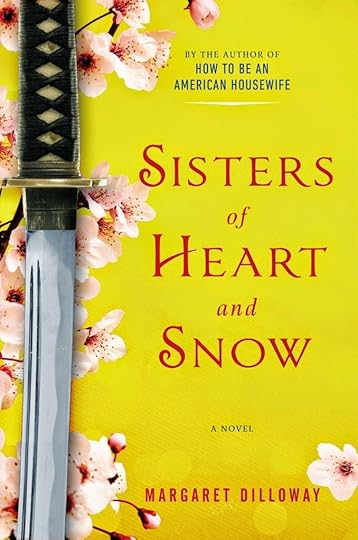

I always want to know what sparked a particular book? What was the question haunting you that drove you to write?
“How do we love difficult people?” is a frequent topic of conversation among the women I know. There’s always someone having trouble with a relative or in-law, and they wonder—at what point do I give up on this person? How much should I guard my heart?
What is it about sisters that is so fascinating?
I personally always wished for a sister. Unfortunately, my parents wouldn’t cooperate. I have two brothers. So I had to content myself with jealously observing the sister relationships of my good friends. And now that I have two daughters and a son, I can observe these bonds, too.
The chemistry between sisters is a bit different than that of mixed-gender sibling relationships. Between my kids, the girls have a unique bond with each other. They talk about sensitive issues more, and they also get way more emotional with each other than they do with their brother. And of course the younger one looks to the older one for cues on how to act and live and feel. The younger girl was too upset to sleep the other night—it turns out she was imagining her older sister going away to college next year and getting very sad about it.
You have a book within a book, a story of a real-life female samurai Tomoe Gozen, that I found absolutely mesmerizing. How did you find out about her? What was the research like and what surprised you?
One day, my father mentioned that my mother was from a samurai family—and didn’t I know that? Um, no, I definitely did not. On a whim, I wondered if there were any female samurai, and I found Tomoe. Later, I looked up the origin of my mother’s clan and found it originated from the Minamoto in the 15th century—so I had this tie to Tomoe.
The research was both difficult and easy. It was difficult because I don’t read Japanese and I had to depend heavily on English works that may not have been complete—I had no way of knowing how complete or incomplete they were. I got help from a great online resource called the Samurai Archives with getting a lot of details correct.
On the other hand, it was easy because there wasn’t that much known about Tomoe or Yamabuki, so I could make up a lot.
I think the most difficult thing overall was not putting my own contemporary take on how Tomoe’s life should have been, but rather try to convey how it was for her and Yamabuki at the time.
I was also interested in how you explored dementia (my own mother now has it) with great sensitivity.
Thanks. Well, unfortunately I’ve had the opportunity to observe this firsthand over the recent years in a few different people. My husband’s grandparents both had dementia. It was of course sad, yet it was also helpful to accept the reality that these loved ones may not know who you are anymore, but you can still visit and honor them and have some small happy moments with them. My husband’s grandfather always liked being taken out and watching the little kids play. He didn’t know they were his great-grandchildren, but he enjoyed his time with them anyway.
What kind of writer are you? Do you outline? Do you have rituals? Do you wait around for the pesky Muse?
I write a little outline— the set up, the inciting incident, etc.—and then I use that as my roadmap.
I’m one of those who believes that the Muse works for me, not the other way around. And I believe that Thomas Jefferson quote: “I am a great believer in luck, and I find the harder I work, the more I have of it." Even a bad writing day generally yields something useful—maybe I’ll finally know which direction is WRONG—so nothing is ever really wasted. I just have to put my bottom in that chair and do the time.
What’s obsessing you now and why?
The idea that memories are chemical, so even if you forget something, it’s still stored in your brain. How do we ever get over anything if that’s true? It’s fascinating.
I’m also working on a new children’s fantasy series for Disney-Hyperion that has to do with Japanese myths and monsters, so I’m completely obsessed with strange supernatural creatures at the moment!
What question didn't I ask that I should have?
Why did you expand the book-within-a-book into its own story? The answer is I had a lot of historical material, enough to make a standalone work, separate from this one, and I wanted Tomoe to have her own fully realized story. It’s a historical book called THE TALE OF THE WARRIOR GEISHA and varies quite a bit from what’s in the SISTERS OF HEART AND SNOW pages—I have Yamabuki’s POV in there, for instance. It’ll be available only as an e-Book, so if you want to delve more into that world, you can.
Published on April 06, 2015 19:54
Aline Ohanesian talks about Her Number 1 Indie Pick, Orhan's Inheritance, the power of memory--and words, and so much more
Orhan's Inheritance is Aline Ohanesian's miraculous debut, about history and memory and it's already creating a sensation.
In a starred Kirkus (harder to get than finding a diamond at your feet), a critic raves, "A novel that delves into the darkest corners of human history and emerges with a tenuous sense of hope." The book is a Number One Indie Pick and a Barnes & Noble Discover New Writers Pick. Her writing was a finalist for the PEN Bellwether Award for Socially Engaged Fiction and the recipient of a Glimmer Train Best New Writers Award. I'm thrilled to have her here. Thank you, Aline.

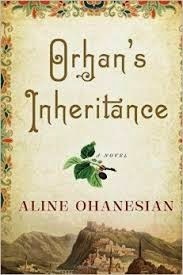
Every novel has a moment of origin, which I always find fascinating. What sparked the writing of this particular book?
I get a little shy when I'm asked to talk about this because for the most part, I'm a real "normal," level-headed person, but the moment of origin for this novel was so out there. I was resting after a sleepless night with my baby when I heard a voice. I could tell it was female and I knew she was old. She said only a few sentences about the futility of words. How they take an event and immediately corrupt it with meaning. I love words and language. I would never say or think something like that. I wrote what I heard down on a scrap piece of paper. I wanted to know who she was and why she didn't want to talk about things. In many ways the whole novel is a pursuit of that woman's voice and story. I never heard anything after that. Not like that.
So I started constructing, using my imagination, but also using the stories my great-grandmother Elizabeth told me about her own experiences at that time. Both my paternal grandparents were also survivors. I wanted to honor them by telling their stories. What's really kind of miraculous is that seven years later, when I got my first review by Kirkus, the reviewer used only one quote from the book. It was the same two sentences that came to me all those years ago. Writing is a lot like construction. There's a lot of structure and thinking involved but in the best of circumstances, there's also a great deal of magic and mysticism.
I’m always fascinated by the way writers write. Can you please talk about your process? Do you have rituals? Do you outline? Or do you wait for that pesky muse?
I'm not one of those writers who thinks about her word count. When I know I want to write about a particular subject, I start doing a lot of associative reading. I read history books to make sure I know everything I can about the time and place I'm writing about. There's a lot of research involved in writing historical fiction. Fortunately, I have a masters degree in history and I love doing research. Once I know all I can about the political and social landscape of the novel, I put all that aside and focus on the uniqueness of the particular characters I'm exploring. I make a rough outline but I reserve the right to abandon it if the characters dictate it.
So much of the novel is about the power and purpose of memory. Why should we remember when it causes pain? How can memory save us in some ways? And when should the past inform the future?
These are such great questions! I think stories are the most basic units of human understanding. If you think about it, we use words, language and stories to understand ourselves and the world around us. Which stories we choose to remember and which we choose to forget have an impact on who we are both as individuals and collectively. Two siblings from the same family often will give you two different versions of that family's past. Why? Because they remember differently.
I happen to believe that the past informs the future whether we remember it or not. That doesn't mean we don't have any power or agency. As individuals, we may be products of our past, but we don't have to be prisoners of it. When your talking about a collective past or a national past, things get even trickier. A nation is defined by what they choose and not choose to remember. What would the US look like if we refused to acknowledge slavery or Japanese internment camps? That's the situation in Turkey. For a long time, almost one hundred years, it was illegal to remember the stories I'm telling in this novel.
“Words corrupt everything with meaning,” one character says, and while you could argue this is true, isn’t it also true that they unveil meaning?
I love words. What writer doesn't? They are so much more powerful than we give them credit for. Words are the building blocks of existence as we know it. There's a great quote by the philosopher Martin Heidegger that says, "Language is the house of being. In its home man dwells. Those who think and those who create with words are the guardians of this home." So you and I and the historians but also just anyone who wishes to tell any kind of story, even verbally, are the guardians of this house of being. Everybody who speaks or thinks creates their world with words, but those of us who are read / heard widely have a greater responsibility. We have to be more conscious of what stories we choose to tell and why. And as far as the characters go, I think by the end of the novel, almost every single one of them come to the understand the power of words.
Orhan actually inherits much more than a business. Can you talk about this, please?
Poor Orhan. He's such a decent guy. He inherits the business but it comes at a considerable cost. I wanted him to inherit the knowledge of his family history and his country's history. To be a fully formed individual, he has to take the good and the bad. By the end of the novel, he's no longer apathetic about things. Once his eyes have been opened to the past, he can no longer be complacent.
You’ve had an extraordinary debut--widespread praise, a fabulous publisher, starred reviews. Does this make it easier or more difficult to write your next book?What’s obsessing you now and why?
When I started writing this novel, I had never taken a writing course and I didn't know a single person in publishing. So it will be easier in that I don't have to find an agent and I probably don't have to worry so much if the next one will sell. I started writing the second novel way before any reviews or praise came in so I know that the writing part of it will be the same: blissfully satisfying one minute and terribly difficult the next. I try not to obsess about things in real life, because I've learned I have no control over that but I'm extremely obsessive when it comes to my subject matter. When I was writing ORHAN, I talked incessantly about the characters as if they were real. I wanted to know absolutely everything from that time and place. What did the soldiers eat, how did Lucine's mother bake bread? It got so bad that my young sons would mention my characters by name in casual conversation. Right now I'm obsessing over 19th century California, which means I spend all day reading and thinking about Franciscan priests, Mexican nationalists and the Gabrieleno Tribe of Native Americans.
What questions didn’t I ask that I should have?
Which character did you love writing about the most?
I love Fatma. She's hilarious and cunning. She's a lot like the feisty women in my own community. They are feminist without ever knowing that word. Plus, the idea of this funny aging former prostitute in the middle of a devout muslim community was irresistible. I could write a whole book from her point of view but it would be a VERY different kind of book.
Published on April 06, 2015 13:05
Mary Morris talks about her shimmering masterpiece, The Jazz Palace, jazz, a love letter to Chicago and so much more
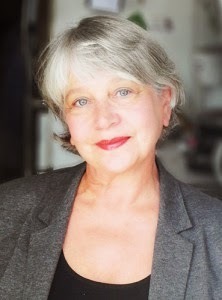
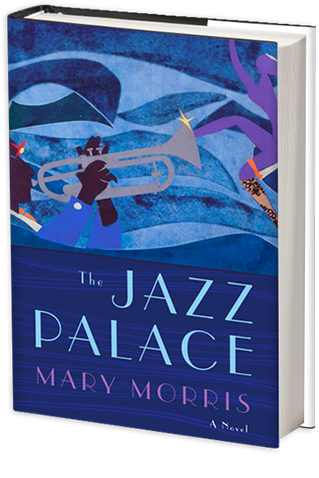
I first met Mary Morris through her novels, starting with The Waiting Room, a book I loved so much that I spent months trying to track her down, (okay, I was sort of a stalker), and I finally found her through her husband, Larry O'Connor, when Larry and I were reading together. File this under "sometimes you can get what you want"--we became great friends, talking about everything from personal shoppers, grown-up children, food, letting go--and of course writing. I can't imagine a day going by without getting an email from Mary. I've loved all of Mary's work, but this one--The Jazz Palace, is a masterwork.
As haunting as a jazz riff, The Jazz Palace is about art and relationships, and jazz in Chicago, and I guarantee it's unlike anything you've read before.
Mary's the author of Vanishing Animals, The Bus of Dreams, and The Lifeguard Stories, Nothing to Declare: Memoirs of a Woman Traveling Alone, Wall to Wall: from Beijing to Berlin by Rail, and Angels & Aliens: A Journey West. Her five novels include The Waiting Room, The Night Sky (formerly published as A Mother’s Love) and House Arrest.Her many novels and story collections have been translated into Italian, Spanish, German, Dutch, Swedish and Japanese. She lives in Brooklyn, New York with her husband and teaches writing at Sarah Lawrence College. Mary will be reading at the Community Bookstore in NYC on April 16th (and lots of other places, too.) I'm not missing it, and you shouldn't either. I'm so honored and happy to host Mary here! Thank you, Mary!
To me, the novel was like jazz itself, moving in and out of themes, inventive, free form, and deeply soulful. How difficult was that to plan--and to get so absolutely right?
First, thank you for this. And it wasn’t planned at all. I spent years trying to understand jazz. Every time I got close it eluded me. But at a certain point it occurred to me that, even though I couldn’t articulate what jazz was, the book itself was taking the shape of a jazz composition. It happened intuitively. So I am thrilled that you saw it that way. In many ways The Jazz Palace was more rendered than written. It went through literally hundreds of drafts and versions and like a good stew I kept boiling it down to its essential elements. I kept reducing it to its essential elements until it became what it is.
It began as a sprawling 800 pages multi-generational family saga that began in 1915 and ended in 1968. Now it is 250 p. novel that covers a much shorter, and more focused, time period. And of course during that whole time I listened to a lot of jazz – pretty much all the time. I mean how many times can you listen to “Cherokee” or “Waltz for Debbie?” Ten thousand? Well, I listened more. And at a certain moment I realized that the novel with its various threads, its “solos” and ensemble moments, and, as you say, free form was basically what I’d been listening to. It was organic and, dare I say, improvised, but at a certain point the novel just became the thing that it was about.
You’ve said that it took you seventeen years to write this novel. Were you consistently writing? What stopped you? What surprised you in the writing? How is this final book different from its beginnings?
Well, in the initial book the character of Anna had twenty-two children and Benny had a half-sister with whom he meets as a young man and has an incestuous affair. (I probably shouldn’t tell you this.) Also, as I said above, the early version went until 1968 and the story of Benny’s daughter, Harriet, more or less takes over. Essentially the book you have now is pretty much half of what I wrote. I told about this more below. I think I was floundering around for the story and obviously none of this is in the current version. I wasn’t consistently writing it. When it got rejected the first (when it was 800 pages long), I sat down a wrote a short novel, called Revenge. Then I went back to the jazz book and it got rejected on its second round. It was at about this time that I wrote The River Queen. Then came the dark years when I published nothing and was fairly certain that this book would never see the light of day.
Two things surprised me in the writing. The first was that no matter how much the plot shifted, the characters remained more or less the same. And the other was that the book could take so many forms and yet somehow, again, be the same. It was an odd experience. I felt as if I was doing battle with a multi-headed hydra. In the end the book you have is very different from the one I began with. And yet strangely in many ways it is the same.
The history, from Shoeless Joe Jackson to the start of Jazz, to Al Capone were real and fascinating. What was the research like?
I loved doing the research. I can honestly say I devoured it. Once I’m inside a project, and I was inside this one, I’m, well, “in.” It’s very odd. I might be totally into, say, meteorites because I’m writing something that has meteorites in them. I’ll read everything I can. But then somehow when the book is over, meteorites become just like any other object that I have some passing interest in. I suppose it’s a lot like love (and god knows I’ve been obsessive about love). I can completely take you over. But then when you’re out of love, that person become just another person. And you wonder what the big deal was. Anyway I loved all the research. Perhaps the most compelling, and difficult part, was trying to learn to play jazz piano which I wasn’t very good at, but it did give me more a feel for what a jazz musician must do.
In a sense this novel is also a love letter to Chicago of a certain place and time. There’s a lot in here about jazz, race relationships, and the way music transforms people. Could you talk about that?
I have always, always loved music and I’ve always loved Chicago. Why I left is complicated. It was the right thing at the time. It was what I had to do. I’ve lived in New York for decades. It’s my home but Chicago has my heart. Growing up for me was a lot about music. It was, after all, the 60s and I can’t think of an era that was more about the music except for, perhaps, the 1920s. My dad, who married late, (I was born when he was in his late 40s) was a pretty good piano player. He used to hang out in the black and tans in the 1920s and he played for his friends, at rent parties, bar mitzvahs, etc. And he had lots of stories about Chicago. So I guess music and Chicago were a natural to come together.
The whole matter of race came from a different impetus. As a girl, involved in the Civil Rights Movement I always wondered why Chicago divided itself right at S. 12thStreet between North and South, rich and poor, white and black. I just didn’t get it though now I do. There’s a wonderful book that talks about this called Black Metropolis. Initially the book didn’t have a black character. Napoleon was born when I was riding in a cab on my way to the airport. We were driving by some projects in Brooklyn near where I live and I saw, painted on a building, graffiti that read, “Napoleon Hill, R.I.P.” By the time I got to the airport Napoleon was born.
Again as a child of the 1960s we used to go down to the South Side of Chicago to the Regal Theater where the best acts of Motown played. I have a friend named David Lauderstein and he led the charge. He was a musician (and still is) and he knew that what was happening was happening on the South Side. Another friend, jazz critic and writer, Krin Gabbard, says that jazz is as much about race and sexuality as it is about anything else.
Anyway music brings us all together the way that nothing else can. Well maybe a great meal. But music has that power.
Benny’s teacher tells him that music, all things return to where they begin. And in a sense, the book flies off with innovations, and then it does have its own sort of return, which I won’t give away. But you had told me that you lobbed off the last 100 pages of the book, and I’m curious how you knew those pages had to go.
It’s not easy to answer this question without giving away the ending but I’ll do the best I can. Initially, and for years really, the book spanned from 1915 until the Democratic Convention in Chicago in 1968 and it ended with Benny’s daughter’s story. In other words it was a multi-generational family saga. For years I tried to sell it that way but I kept getting feedback that after a certain point the story grew flaccid (no other word to use here, really). In the summer of 2012 I was rereading Ragtime by E.L. Doctorow and I was struck by what a time constraint of time he used within which to tell his story. I literally woke up one morning and knew exactly where the book had to end and perhaps where it had needed to end all along. I went downstairs, and lobbed off the last 175 pages and that is the novel you have.
The language of the book is incredibly beautiful. From the gem sisters to certain thrilling lines (“Everybody wanted to save someone”), the book is as haunting as anything by Miles Davis. What came first for you, the story of the language?
Well, let’s return to the jazz metaphor. I think it’s impossible to separate the story from the language any more than you can separate the melody from the tune. I will say that certain phrases in the book such as the one you mentioned above and others such as “The gem sister slept in the order in which they were born” or “Pearl found the absence of sound” were always in the book. They didn’t change. Those sentences are in a sense anchors for the story. They ring and rang very true to me. I can’t separate the story from the sentences in those instances, can you? It’s a hard thing to say but I think that sometimes we do something that is just very honest and very true and when we do that it feels right. It is right. That’s how the language came to me.
I read a essay once about George Bush’s weird language bloopers and the writer said that Bush only fumbled his words when he was telling a lie (which was pretty often). He never stumbled when he was telling the truth. It’s true for all of us, isn’t it?
I will say that I worked on every single sentence of this book until I thought I’d squeezed the life out of them. I read them out loud. I woke up in the middle of the night with changes stuck in my head. To say that this is as “haunting as anything by Miles Davis” pretty much blows me away. I definitely lived inside of it, and lived inside of these sentences for a long time.
Why did you stick with it?
Ha, I suppose the answer here could be why did it stick with me? I’m only half kidding. I put this book away many times. I also dragged it around the world with me for years. I rewrote it in Prague, in Italy, in Spain, and wherever else I went. And then I’d put it away. But it wouldn’t exactly go away. I’d wake up anxious in the middle of the night. It was as if my child had gone away and I had to find the way to bring her home. I’m sure I would have gone on like this if I hadn’t woken up one morning about three years ago now and realized what was wrong with the book. It was a eureka moment. One I still see vividly. I went to my desk, took out the manuscript, and went right to the page where I knew it had to end. I threw away the rest (about 175 pages at that point) and I began again.
What’s obsessing you now and why?
I’m hoping this isn’t another seventeen year odyssey but I’m writing about crypto-Jews who escaped Spain in 1492 and wound up in the hills of New Mexico. The novel begins in 1992, then moves around in time a lot. So I’m reading the diaries of Columbus and the history of Jews in Mexico and New Mexico and a lot of the journeys of spices and caravans which is fascinating. Also a lot about astronomy because I have a contemporary character who is an amateur astronomer. Oh and celestial navigation. Who knows what the final book will be? I’m always rendering these things down. But it will be done in a few years. No more. I’ve promised myself that.
Published on April 06, 2015 10:38
March 27, 2015
Alfred DePew talks about A Wedding Song for Poorer People, creativity and commerce, taking risks, and so much more
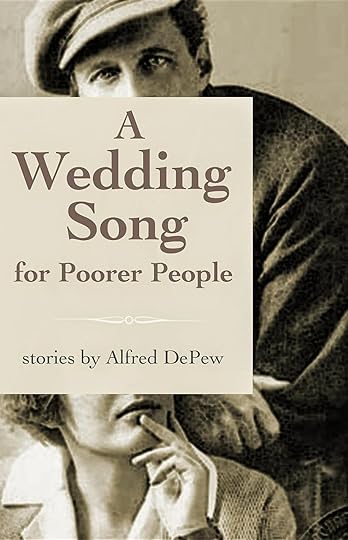
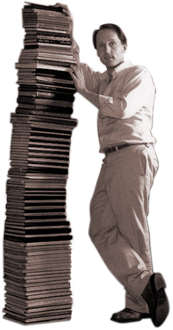
I met Alfred DePew at the Virginia Festival of Books and we got to talking after my reading. When I found out that he was also a writer, I snagged him for my blog. He's been a bookseller, theater press agent, social worker, and advertising copywriter, a short story writer and a coach, and he's taught in France, Spain, England, Estonia, and Russia, as well as at the universities of Vermont, New Hampshire, the Salt Institute for Documentary Studies, and the Maine College of Art. Now he leads writing, creativity and leadership workshops throughout Maine and the United States. His first book won a Flannery O'Connor Award, and his second book, A Wedding Song for Poorer People (great title) is all about the longing that exists in all of us.
Alfred and I had a hours long conversation by phone. I typed out notes! I wrote them by hand! We were both laughing and engaged!
And I lost the notes.
But there is always something that remains, and here it is. And I'm absolutely thrilled to have Alfred here!
<!-- /* Font Definitions */ @font-face {font-family:Times; panose-1:2 0 5 0 0 0 0 0 0 0; mso-font-alt:Times; mso-font-charset:0; mso-generic-font-family:auto; mso-font-pitch:variable; mso-font-signature:3 0 0 0 1 0;} @font-face {font-family:"MS 明朝"; mso-font-charset:78; mso-generic-font-family:auto; mso-font-pitch:variable; mso-font-signature:-536870145 1791491579 18 0 131231 0;} @font-face {font-family:"Cambria Math"; panose-1:2 4 5 3 5 4 6 3 2 4; mso-font-charset:0; mso-generic-font-family:auto; mso-font-pitch:variable; mso-font-signature:-536870145 1107305727 0 0 415 0;} @font-face {font-family:Cambria; panose-1:2 4 5 3 5 4 6 3 2 4; mso-font-charset:0; mso-generic-font-family:auto; mso-font-pitch:variable; mso-font-signature:-536870145 1073743103 0 0 415 0;} @font-face {font-family:"Lucida Grande"; panose-1:2 11 6 0 4 5 2 2 2 4; mso-font-charset:0; mso-generic-font-family:auto; mso-font-pitch:variable; mso-font-signature:-520090897 1342218751 0 0 447 0;} /* Style Definitions */ p.MsoNormal, li.MsoNormal, div.MsoNormal {mso-style-unhide:no; mso-style-qformat:yes; mso-style-parent:""; margin:0in; margin-bottom:.0001pt; mso-pagination:widow-orphan; font-size:12.0pt; font-family:Cambria; mso-ascii-font-family:Cambria; mso-ascii-theme-font:minor-latin; mso-fareast-font-family:"MS 明朝"; mso-fareast-theme-font:minor-fareast; mso-hansi-font-family:Cambria; mso-hansi-theme-font:minor-latin; mso-bidi-font-family:"Times New Roman"; mso-bidi-theme-font:minor-bidi;} .MsoChpDefault {mso-style-type:export-only; mso-default-props:yes; font-family:Cambria; mso-ascii-font-family:Cambria; mso-ascii-theme-font:minor-latin; mso-fareast-font-family:"MS 明朝"; mso-fareast-theme-font:minor-fareast; mso-hansi-font-family:Cambria; mso-hansi-theme-font:minor-latin; mso-bidi-font-family:"Times New Roman"; mso-bidi-theme-font:minor-bidi;} @page WordSection1 {size:8.5in 11.0in; margin:1.0in 1.25in 1.0in 1.25in; mso-header-margin:35.4pt; mso-footer-margin:35.4pt; mso-paper-source:0;} div.WordSection1 {page:WordSection1;} </style><br />--> <div class="MsoNormal" style="mso-layout-grid-align: none; mso-pagination: none; text-autospace: none;"><span style="font-family: Arial,Helvetica,sans-serif;"><span style="font-size: small;"><b><span style="font-family: Times; mso-bidi-font-family: Times;">For most writers I know, every book presents a new challenge. The writing process is almost never the same. How did that process differ for you in writing A Wedding Song for Poorer People?</span></b></span></span></div><div class="MsoNormal" style="mso-layout-grid-align: none; mso-pagination: none; text-autospace: none;"><span style="font-family: Arial,Helvetica,sans-serif;"><span style="font-size: small;"><br /></span></span></div><div class="MsoNormal" style="margin-left: .5in; mso-layout-grid-align: none; mso-pagination: none; text-autospace: none;"><span style="font-family: Arial,Helvetica,sans-serif;"><span style="font-size: small;">After my first book was published in 1992, I thought I should know a thing or two about writing a story. I thought I could probably write the kind of story (what the hell does that mean?) that gets accepted by The New Yorker or The Atlantic Monthly. So I set about to write new stories, and everything felt flat. Never before when I wrote had a given publication a thought, much less a particular magazine. I wrote to find out what my characters would do next. Period. So I was stuck. Everything I wrote felt flat because I was writing for the wrong reason. There was no joy, no discovery, no messing around. I was trying to be competent. Deadly. So I signed up for an oil painting class Thursday evenings, and I was in heaven. I didn’t know the hell I was doing. Everything was a risk and a mystery. I was learning again, discovering again, and that experience helped me back into writing.</span></span></div><div class="MsoNormal" style="margin-left: .5in; mso-layout-grid-align: none; mso-pagination: none; text-autospace: none;"><span style="font-family: Arial,Helvetica,sans-serif;"><span style="font-size: small;"><br /></span></span></div><div class="MsoNormal" style="margin-left: .5in; mso-layout-grid-align: none; mso-pagination: none; text-autospace: none;"><span style="font-family: Arial,Helvetica,sans-serif;"><span style="font-size: small;">I’d been given a fellowship at the Wurlitzer Foundation in Taos, New Mexico for 1995, and I’d made 3 trips to Russia (1990, 91 & 93) which had given me an idea for what I thought might be a novel, and which turned out to be the title novella, A Wedding Song for Poorer People. So I was working in a different form which changed everything really—the number of characters, time, pacing, context, scope, the shape of the thing. Because I didn’t know what I was doing, I was happy again, messing around, free to take big risks.</span></span></div><div class="MsoNormal" style="mso-layout-grid-align: none; mso-pagination: none; text-autospace: none;"><span style="font-family: Arial,Helvetica,sans-serif;"><span style="font-size: small;"><br /></span></span></div><div class="MsoNormal" style="mso-layout-grid-align: none; mso-pagination: none; text-autospace: none;"><span style="font-family: Arial,Helvetica,sans-serif;"><span style="font-size: small;"><b><span style="font-family: Times; mso-bidi-font-family: Times;">Your stories are full of longing, a painter who can’t paint, a man who is tormented by his wife’s friendship with her gay hairdresser, and so many who do “what they need to do stay alive.” But all do, and what impressed me so much is that no matter how dire the situation, your characters always find that thin line of hope. Could you talk about that please?</span></b></span></span></div><div class="MsoNormal" style="mso-layout-grid-align: none; mso-pagination: none; text-autospace: none;"><span style="font-family: Arial,Helvetica,sans-serif;"><span style="font-size: small;"><br /></span></span></div><div class="MsoNormal" style="margin-left: .5in; mso-layout-grid-align: none; mso-pagination: none; text-autospace: none;"><span style="font-family: Arial,Helvetica,sans-serif;"><span style="font-size: small;">I guess my characters always find that thin line of hope because I believe it is there.</span></span></div><div class="MsoNormal" style="mso-layout-grid-align: none; mso-pagination: none; text-autospace: none;"><span style="font-family: Arial,Helvetica,sans-serif;"><span style="font-size: small;"><br /></span></span></div><div class="MsoNormal" style="mso-layout-grid-align: none; mso-pagination: none; text-autospace: none;"><span style="font-family: Arial,Helvetica,sans-serif;"><span style="font-size: small;"><b><span style="font-family: Times; mso-bidi-font-family: Times;">I want to ask you, why short stories or novellas and not a novel? </span></b></span></span></div><div class="MsoNormal" style="mso-layout-grid-align: none; mso-pagination: none; text-autospace: none;"><span style="font-family: Arial,Helvetica,sans-serif;"><span style="font-size: small;"><br /></span></span></div><div class="MsoNormal" style="margin-left: .5in; mso-layout-grid-align: none; mso-pagination: none; text-autospace: none;"><span style="font-family: Arial,Helvetica,sans-serif;"><span style="font-size: small;">I wish this were more of a conscious decision, but even when I think I’m heading into writing a novel and type pages and pages and think I have a really BIG thing with lots of moving parts, it always gets compressed down into a shorter form.</span></span></div><div class="MsoNormal" style="mso-layout-grid-align: none; mso-pagination: none; text-autospace: none;"><span style="font-family: Arial,Helvetica,sans-serif;"><span style="font-size: small;"><br /></span></span></div><div class="MsoNormal" style="mso-layout-grid-align: none; mso-pagination: none; text-autospace: none;"><span style="font-family: Arial,Helvetica,sans-serif;"><span style="font-size: small;"><b><span style="font-family: Times; mso-bidi-font-family: Times;">You also teach--how does that impact your own work?</span></b></span></span></div><div class="MsoNormal" style="mso-layout-grid-align: none; mso-pagination: none; text-autospace: none;"><span style="font-family: Arial,Helvetica,sans-serif;"><span style="font-size: small;"><br /></span></span></div><div class="MsoNormal" style="margin-left: .5in; mso-layout-grid-align: none; mso-pagination: none; text-autospace: none;"><span style="font-family: Arial,Helvetica,sans-serif;"><span style="font-size: small;">The risks my students took almost always inspired my own. I miss that. I left college teaching in 2003. Sometimes I run small writing workshops in my office, and I still like coaching writers through long projects like a novel.</span></span></div><div class="MsoNormal" style="mso-layout-grid-align: none; mso-pagination: none; text-autospace: none;"><span style="font-family: Arial,Helvetica,sans-serif;"><span style="font-size: small;"><br /></span></span></div><div class="MsoNormal" style="mso-layout-grid-align: none; mso-pagination: none; text-autospace: none;"><span style="font-family: Arial,Helvetica,sans-serif;"><span style="font-size: small;"><b><span style="font-family: Times; mso-bidi-font-family: Times;">I have to say I was fascinated by your bio. Not only are you a Flannery O’Connor Award-winner, but you also have a private consulting practice in dream work and spiritual direction. I’d love to hear more about that, and I’d also like to know how that informs your writing.</span></b></span></span></div><div class="MsoNormal" style="mso-layout-grid-align: none; mso-pagination: none; text-autospace: none;"><span style="font-family: Arial,Helvetica,sans-serif;"><span style="font-size: small;"><br /></span></span></div><div class="MsoNormal" style="margin-left: .5in; mso-layout-grid-align: none; mso-pagination: none; text-autospace: none;"><span style="font-family: Arial,Helvetica,sans-serif;"><span style="font-size: small;">In many ways, I feel I’ve kept my various professional lives separate from my writing life, but we both know that’s pretty much impossible. They knock up against each other, compete with each other, feed each other in ways I don’t recognize until much later. I wrote about a massage therapist before I became one myself. I wrote about Roger’s religious crisis a good six years before I joined the Catholic Church. I don’t think of myself as an autobiographical writer, but in some ways, my fiction prefigures parts of my life, as if I were trying out various roles through my characters.</span></span></div><div class="MsoNormal" style="mso-layout-grid-align: none; mso-pagination: none; text-autospace: none;"><span style="font-family: Arial,Helvetica,sans-serif;"><span style="font-size: small;"><br /></span></span></div><div class="MsoNormal" style="mso-layout-grid-align: none; mso-pagination: none; text-autospace: none;"><span style="font-family: Arial,Helvetica,sans-serif;"><span style="font-size: small;"><b><span style="font-family: Times; mso-bidi-font-family: Times;">What’s obsessing you now and why?</span></b></span></span></div><div class="MsoNormal" style="mso-layout-grid-align: none; mso-pagination: none; text-autospace: none;"><span style="font-family: Arial,Helvetica,sans-serif;"><span style="font-size: small;"><br /></span></span></div><div class="MsoNormal" style="margin-left: .5in; mso-layout-grid-align: none; mso-pagination: none; text-autospace: none;"><span style="font-family: Arial,Helvetica,sans-serif;"><span style="font-size: small;">Contemplative prayer. Why? I guess that’s for a longer conversation.</span></span></div><span style="font-family: Arial,Helvetica,sans-serif;"><span style="font-size: small;">\</span></span>
Published on March 27, 2015 13:19
Jan-Philipp Sendker talks about Whispering Shadows, China, crime novels, and so much more
I first met Jan-Philipp Sendker through his book, The Art of Hearing Heartbeats, which was one of those life-changing reads. To my delight, I was able to meet him at Booktopia, which cemented my reverence for his art. Born in Hamburg in 1960, he was the American correspondent for Stern from 1990 to 1995, and its Asian correspondent from 1995 to 1999. In 2000 he published Cracks in the Great Wall, a nonfiction book about China. He lives in Berlin with his family, and his latest book, Whispering Shadows, set against the seamy backdrop of modern day China, he melds a love story and a crime story to create something original, thrilling and moving, giving us a ravishing murder story. I'm thrilled to have him here! Thank you so much, Jan-Philipp!

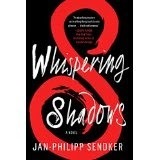
Every novel has a moment of origin, which I always find fascinating. What sparked the writing of this particular book? And why a trilogy?
I don’t think there was THE moment which sparked this particular book. I used to live in Hong Kong as a foreign correspondent covering China and was endlessly fascinated by it. This time in history, the huge changes, the transformation, it is a gold mine for a novelist. After countless trips to China over the years I had so many stories, so much material that I wanted to turn it into a novel. There is so much anger, pain and grief in China. I wanted to give some if the people I had interviewed a voice I could not as a journalist. At the same time it always surprises me how little we one in the West about China, its culture, its history, the difficult situation the country is in at the present. So if my books help the reader to understand China a little better I would be more than happy. The reason for the trilogy is simple. I fell in love with my main characters and could not let go…and still had so many China stories to tell.
What’s fascinating to me is that although this is a suspense novel, it still is deeply thoughtful, and the writing, as always with you, is just gorgeous. It’s truly much more than a detective story. Did you feel any constraints while writing it? Were there any surprises?
I am glad you say it is much more than a detective story because that is they way I see it as well. I am not a great reader of crime or detective stories myself. I kind of use the suspense angel to move the story but I think it is much more about the characters and their stories and the pain and grief and drama in the Chinese society in transformation. But I am very happy when people say they like the crime aspect as well. It should also be an entertaining read.
The surprise was how difficult it is to follow the crime aspect without contradictions, that it all makes sense in the end. It increased my respect for the genre.
You write so richly about the old China verses the new--and how new is not necessarily better. Can you talk about this please?
Uhh-- that is a very good question, I have been writing three books about it. In many ways the new China is much better. The living standard of hundreds of millions of people have improved. It is a much freer society at the same time the country, the people are paying a very high price. The destruction of the environment and the emotional burden and issues, nobody knows the outcome of this process of transformation. I have been visiting China for twenty years now and recently I have become much less optimistic.
I’m always fascinated by the way writers write, but writing a trilogy is something different. Do you know what each of the books will do and cover? Or are you about to discover that in the writing?
I did not plan the trilogy from the very first moment. While I wrote Whispering Shadows. I really fell in love with the characters to an extend that I cried after I had finished the last sentence. I did not want to leave them. I did not want to leave Hong Kong and China. And I still had so many stories to tell. Therefore I decided to write a trilogy. I sat down and thought what are the most important issues in Chinese society today and for China's future. First: The long shadow of the past. That is one of the key issues in Whispering Shadows. Second: The legal system and the environmental pollution. Those are the main issues in the second book Dragon Games. which will be published in the US next year. (It is kind of a legal thriller) Third: The total lack of ethics, of values, of trust in China today. A society without any of it is doomed. That is the main topic in the third book which I am currently writing. But that is just the topic. How the story how the characters evolve is different. That is always a surprise to me. Writing is like a journey I take myself onto. I don’t know the outcome. Luckily, otherwise I might be bored.
What’s obsessing you now and why?
Finally a question which is easy to answer. I am writing the third book in the trilogy and I am obsessed with Paul and Christine and their journey. As always it is a fascinating process and I enjoy it tremendously, even though it s a bit exhausting at times...
What questions didn’t I ask that I should have?
How do you feel about the release of Whispering Shadows in the USA?
As with all my books: I am incredibly thrilled and anxious at the same time. Will my readers be moved by Paul's journey? Will they find it interesting, entertaining? Will they love him they way I do?
Published on March 27, 2015 13:10
March 25, 2015
It's time for a Sara Gruen-packed post to celebrate AT THE WATER'S EDGE
Come on, who doesn’t worship Sara Gruen? Not only does she live in pajamas (and post photos of it), but she’s warm, generous, hilariously funny, and a brilliant writer. And she’s also a friend. And to celebrate her new book and mostly to celebrate her, I decided to do something different and have a Sara-packed blog post filled with interviews and photos.
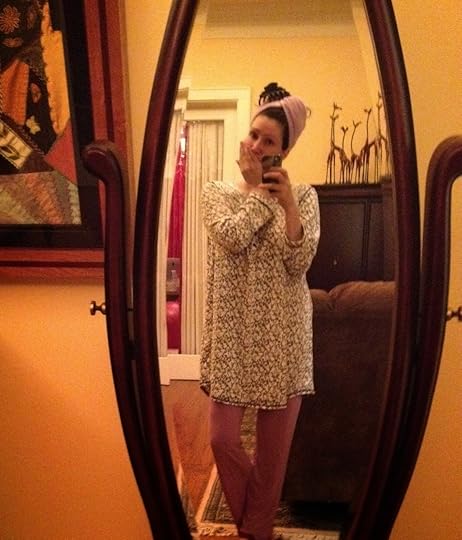
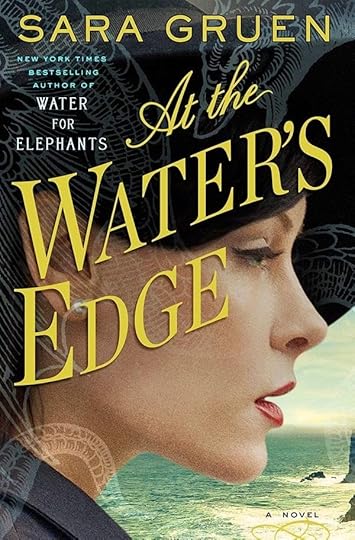
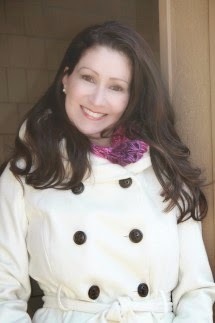
Sara, of course, is the #1 New York Times and USA Today bestselling author of Water for Elephants, Ape House, Riding Lessons, and Flying Changes. Her works have been translated into forty-three languages, and have sold more than ten million copies worldwide. Water for Elephants was adapted into a major motion picture starring Reese Witherspoon, Rob Pattinson, and Christoph Waltz in 2011 and it’s soon to be on Broadway! And it just got on the April Library Reads List!
Her latest novel, At The Water’s Edge, is about class and monsters (Loch Ness and Nazis) and a young woman’s learning to peel back the layers of life to see what is really there. Set against a tiny Scottish Village (Sara’s a master of story world. All you have to do is read the first page of Water for Elephants to have already known that.)
Let's pause for praise:
“If I needed a reminder why I am such a fan of Sara Gruen’s books, her latest novel provides plenty. Unique in its setting and scope, this impeccably researched historical fiction is full of the gorgeous prose I’ve come to expect from this author. And even after the final page, its message still resonates with me: The monsters we seek may be right in front of us. In fact, the only fault I can find with this book is that I’ve already finished it.”—Jodi Picoult, New York Times bestselling author of Leaving Time
“Sublime . . . a natural for the book-club set.”
—Booklist
“I devoured this book. Once again Sara Gruen has proven herself to be one of America’s most compelling storytellers. You might be tempted to rush to get to the answers at the end—but don’t, or you’ll miss the delectable journey that is Gruen’s prose.”—Kathryn Stockett, New York Times bestselling author of The Help
“Magical . . . At the Water’s Edge skillfully transports us to a small, tenacious Scottish village in the grip of war, and into the heart of Madeline Hyde, a woman who is a stranger to herself until forces convene to rock her awake. Sara Gruen is a wizard at capturing the essence of her historical setting, and does so here in spades, but it’s Maddie’s unexpected transformation that grounds and drives the novel.”—Paula McLain, New York Times bestselling author of The Paris Wife
Hey, so what about interviews?
Here's one from Publisher's Weekly:
Sara Gruen’s 2006 novel, Water for Elephants (Algonquin) created a huge buzz among independent booksellers for the tale set in a Depression-era circus that catapulted Gruen to literary stardom. Algonquin sold five million copies, a movie adaptation hit theaters in 2011, and just a few weeks ago, it was announced that the novel was being adapted into a Broadway musical. Gruen’s latest tale, At the Water's Edge, also involves animals: this time, it’s the Loch Ness monster, as an American trio’s search for it in rural Scotland at the height of World War II changes their lives.
You’ve said that a vintage photograph in The Chicago Tribune inspired you to write Water for Elephants. Did a similar event inspire At the Water’s Edge?
Although the seeds were sown decades earlier (I first visited Urquhart Castle when I was twelve), the catalyst that turned it from fond memory to book fodder was an online article I stumbled upon four years ago. It was about government secrecy, but what really caught my attention was a 70-year-old declassified letter from Scotland Yard stating unequivocally that the government believed the monster existed. Before I knew it, I’d fallen down a Nessie rabbit hole. At some point over the course of the afternoon, it dawned on me that I was setting my next story.
At the Water’s Edge is set against a backdrop of World War II. What kind of research did you do before writing?
I spent five weeks in the Highlands, scouring the archives at the Inverness Courier, interviewing people who lived in the area during the war, researching the 1st Special Service Brigade, even trying to persuade the equivalent of the U.S. Coast Guard to throw me into the loch. I prowled around the castle, got lost in the Cover, and found myself on the wrong side of the law while exploring WWII ruins that I later discovered were on an RAF field that still contained undetonated bombs.
There is much here about class, both in the U.S. and especially in the U.K. Was there anything about class during that era in either the U.S. or in the U.K. that surprised you?
I wanted to juxtapose how the war affected ordinary people, for whom it was inescapable, with how it affected the privileged, who could choose to watch from a distance. While upper and lower class divides in the U.S. and Scotland appear outwardly similar, contextually they are very different: in the U.S., social status can be inherited, earned, and or bought. For most Scots, the class system is deeply personal and an insulting reminder of the final defeat of the Jacobites in the Battle of Culloden and the forced end of the clan system that followed. I was surprised at the level of hurt that remains to this day over an event that occurred nearly 269 years ago.
Class distinctions are also important in understanding the characters’ motivations. Maddie’s open-mindedness leads to fundamental reevaluations of principles she had previously accepted. Her friendships with Anna and Meg allow her to recognize class distinctions for what they are—artificial barriers that provide one subset of society with a codified justification for feeling superior.
At the Water's Edge and Water for Elephants both feature love triangles. What is it about this dynamic that fascinates you?
Love triangles are a mainstay of storytelling in all its forms—novels, movies, fairy tales, legends, folklore, even religious texts—because conflicting passions are ubiquitous to human nature. Whether that excuses acting upon such impulses is an age-old and oft-revisited question, as is whether there are any circumstances under which it’s acceptable to break with what is a basic tenet of most human societies. This is certainly one of the reasons we explore it so often in fiction, along with consequences and whether they’re always deserved.
Maddie feels much more of a kinship to the Scots women she meets than she does to her own husband. Do you feel that gender trumps all else when it comes to true friendship?
In a word, no. Maddie has never had friends before—she’s never really had anyone at all—so her friendships with Anna and Meg are a turning point in her life. She spent her childhood under the control of her parents: a narcissistic mother whose mission in life was to elicit attention and sympathy from others, and a disinterested father. When Maddie goes to boarding school, the rumors follow her, scuttling any chance she has of making friends. Ellis and Hank befriend her because she’s a novelty; their association with her is an act of rebellion.
It’s not until she is ripped from everything she knows that she starts to see things clearly. Until this point, she has viewed herself through the prism of other people’s perceptions. When she realizes that her former life “was nothing but a pretty, pretty fraud,” she begins to examine who and what she really is. In Scotland, for the first time, Maddie meets people who judge her on her own merits rather than by what she can do for them.
Do you think Loch Ness monster really exists? Why or why not?
I plead the fifth.
READ MORE ABOUT THE BOOK AND SARA From the Asheville Citizen-Times!
AND TUNE IN ON APRIL 1st TO HEAR SARA ON DIANE REHM!
Published on March 25, 2015 09:31



